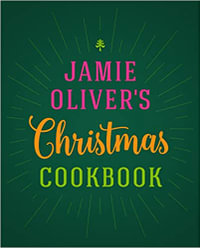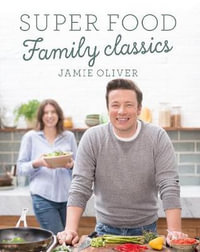
Jamie's Dinners
The Essential Family Cookbook
By: Jamie Oliver
Hardcover | 1 November 2004 | Edition Number 1
At a Glance
336 Pages
25.5 x 20.1 x 3.5
Hardcover
$65.50
or 4 interest-free payments of $16.38 with
orAims to ship in 10 to 15 business days
This book isn't about creating restaurant food. It's about giving you quality options for the way you and your family live now. Most of the recipes use ingredients you can buy in any high street, and you'll find accessible, affordable new ideas for all the old favourites - soups, salads, pasta, meat, fish, desserts, and creative veg alongside some truly groundbreaking stuff.
Jamie's Dinners is the people's cookbook. Everything you'll ever need to know to feed yourself and your family properly for life. What could be more important than that?
About The Author:
Jamie Oliver started cooking at his parents' pub, the Cricketers, at the age of eight, and has gone on to work with some of the world's top chefs. He founded Fifteen restaurant in London and the associated charity, Fifteen Foundation, which trains disadvantaged young people to become chefs. There are now Fifteen restaurants in Cornwall, Amsterdam and Melbourne. Jamie has also launched a chain of high street restaurants in the UK called Jamie's Italian. Jamie writes for publications in the UK and around the world, including his own Jamie Magazine.
Industry Reviews
Jamie should be given the Victoria Cross * The Times *
There is only one Jamie Oliver. Great to watch. Great to cook * Delia Smith *
Over the last two and a half years I've been researching and filming a documentary series looking at the food being served in British schools, to see if we can at last cook tasty and nutritious meals for school kids. I decided to use the same idea in my approach to this book, which means the food is cheap, economical, accessible, easy and time-efficient to make. We all want the same things when making dinner at home for our families.
All the major factors that are needed to make a good affordable school dinner also apply to a mindful, clever cook at home. Availability, accessibility, regionality, affordability, simplicity and a tasty product are the key, with not too much washing-up if you're lucky! Just taking all these words has provided me with a great brief for this cookbook. It's not concerned with fillet steak and lobster and posh stuff. Most of the recipes use pretty standard ingredients that you can buy from street markets or supermarkets all over the country, if not the world.
I think you'll get a lot out of these chapters. They concern themselves with the types of food that most of us are eating every day. For instance, there is a lovely little chapter called Five Minute Wonders, which gives you eight fantastically quick recipes. Perfect for busy lives as each one only takes five minutes or so. I hope a chapter like The Top Ten is really going to inspire you. It's like Top of the Pops, but for food, and it gives you ten crowd-pleasers that everyone loves to eat. The Family Tree chapter takes recipes like a simple tomato sauce or pesto and shows you how to take them further by changing and tweaking here and there, so you can make a whole handful of dishes from just one recipe. I've also included a chapter on sandwiches – you might think this sounds a bit naff, but it's great because it acknowledges that sandwiches are the most widely eaten food product in most western countries. I've tried to show you how you can make really good portable meals to make your work colleagues or friends jealous at lunchtime! Then all your normal chapters follow, like Pasta, Meat and Fish. With Vegetables I've kept things really chatty and shown you that veggies can be a real highlight to your dinner, not just an extra. I've given you various different ways of cooking each vegetable so you can widen your repertoire even more.
I was brought up around food, around chefs and cooks, and I also love nature, agriculture and farming, the changing seasons and the produce that comes with them. You may feel the same way as I do about these things – however, I do think a lot of people just don't understand the importance of where their food comes from or what might have been done to it before they buy it. It's good to question these things.
First, good-quality food and produce – and yes, this may involve organics – is always considered to be middle-class or rich people's food. Wrong. I've worked with students and people on the dole who eat better than some city boys earning hundreds of thousands of pounds a year, and the reason is that they use their heads when buying. Why is this important? Why should you have standards when buying? Because you're going to put this food in your mouth and swallow it and you'll do this two or three times every single day of your life. Everything you eat contributes to you being happy, or fit, or lethargic, or full of energy, or susceptible to colds and flu, or being able to think better and hold your concentration. Your hair, your fingernails, your height, your skin, everything you are is made from the food you eat.
Very rarely does anyone go into a garage, phone shop or shoe shop and ask for 'the cheapest, most rubbish one'. So why do we walk into supermarkets and support those companies that are producing cheap products? As a general rule, when food is cheap the quality is not going to be so good.
It all comes down to your perception of value – is it about buying the cheapest thing you can get, or is it about spending a little more and getting something that tastes nicer, smells better and makes you feel good in return? People in Britain spend the smallest percentage of their weekly wage on food compared to most of the rest of Europe. Europeans tend to spend more on better produce. I think it's a matter of priorities. For instance, before I got married, if I'd suggested that we go out to a half decent restaurant to spend £25 to £30 on a meal, with a few bottles of wine to get tiddly, my friends would not have been interested in the slightest, but if I'd said, 'Why don't we go to the local nightclub?' where we'd have ended up spending £50 on drinks, even my friends who were unemployed or on the dole would have found the money somehow. I don't think it always comes down to money, I think it's a priority thing.
I'd never try to persuade you to necessarily spend more money, but I'd really like you to spend the money you've got more wisely when shopping for food. I've got friends who are unemployed and have time on their hands, yet they fill their shopping trolleys with packets of processed food and soft drinks, with no veggies in sight. And yet this is the most expensive way to feed your family. It is much cheaper to buy fresh produce and cook it than to heat up pre-packaged, processed food. There really isn't much excuse for not giving cooking a go.
Whether I'm at home with my family, or at work with my surrogate family at the restaurant, I enjoy sitting down to eat and chat with them. So what I hope will happen with this book is that you'll get stuck in and enjoy some of these recipes with your friends and family.
ISBN: 9780718146863
ISBN-10: 0718146867
Published: 1st November 2004
Format: Hardcover
Language: English
Number of Pages: 336
Audience: General Adult
Publisher: Penguin UK
Country of Publication: GB
Edition Number: 1
Dimensions (cm): 25.5 x 20.1 x 3.5
Weight (kg): 1.19
Shipping
| Standard Shipping | Express Shipping | |
|---|---|---|
| Metro postcodes: | $9.99 | $14.95 |
| Regional postcodes: | $9.99 | $14.95 |
| Rural postcodes: | $9.99 | $14.95 |
How to return your order
At Booktopia, we offer hassle-free returns in accordance with our returns policy. If you wish to return an item, please get in touch with Booktopia Customer Care.
Additional postage charges may be applicable.
Defective items
If there is a problem with any of the items received for your order then the Booktopia Customer Care team is ready to assist you.
For more info please visit our Help Centre.
You Can Find This Book In

BLACK FRIDAY
RRP $49.99
$24.95
OFF






















